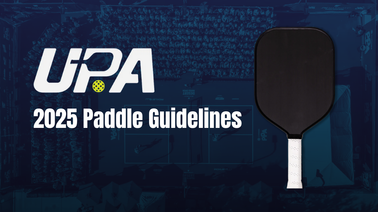
"It's not a bug. It's a feature."
That is a sarcastic saying in the design and development world that defends an error or flaw as though it were intentional.
For example, if you were playing a video game and your character ran off a cliff, but instead of falling, it just floats there, someone may joke that "It's not a bug. It's a feature."
Or, if you paid almost $300 for a pickleball paddle and after "breaking it in," it starts hitting harder than ever due to the material collapsing or expanding inside the core.
A pickleball manufacturer might say, "Oh, that's supposed to happen. It's a feature."
Only in the last example, instead of meaning it sarcastically, they're serious.
That's basically what's happening right now with new pickleball paddles ... and it might be a big problem.
Why is this a problem?
For those who don't care much about what's inside their pickleball paddle, the only thing you really need to understand is that most pickleball paddles are made up of layers, including the core.
Without getting too nerdy, the core provides power and pop, and (depending on the process and material used) it is often the difference between a paddle costing $40 and one that costs (let's say) $280.
Also, inside the paddle are honeycomb-shaped air pockets filled with material to provide strength without adding weight. Polymer, polyurethane, or foam are some of the most common materials used, with foam being the main ingredient in what are being released as "Generation 3" paddles.
As you play with a paddle, especially if it's not manufactured well, these cells can expand or be crushed, causing the paddle to develop a spring-like (or trampoline-like) effect.
As you can imagine, this makes the paddle more powerful on big swings but harder to control on softer shots.
If you've ever squeezed the face of your paddle and it crunches, this is what's happening inside. The paddle is literally breaking.
Playing with a broken paddle is a big no-no for pros and tournament players. They are considered illegal and must be replaced.
Unless, of course, they pass testing. Which is precisely what's happening. At least for some paddle manufacturers.
In rec play, there are no paddle tests to rule out super hot and potentially dangerous paddles. People can play with whatever they want.
And there is the problem.
More power equals more dangerous
Before you go out and buy a paddle to start bashing against a tree trunk in an attempt to craft your own version of Mjollnir, consider whether more power is actually good for your pickleball game.
Also, think about whether it's good for the person playing directly across from you.

We all want to hit better putaways and drives that strike fear into our opponents. But that extra power will always come at a cost. That cost could be control, accuracy, or causing someone to wear an eye patch for the rest of their life.
If you choose to use a hotter-than-it-should-be paddle, you are choosing to put other people at risk.
Is that really okay?
So why is this happening?
Recently, Chris Olson of The Pickleball Studio released a YouTube video discussing the Vatic Pro Oni and the disturbing trend he's been seeing from paddle companies over the last several weeks.

Around the 4:17 mark of the video, he says, "Universally, pressing into your paddle and hearing a crunch or squishing noise for the entire last year has been a bad thing that meant your paddle was out of spec. Now, we're able to advertise it as a feature or selling point?"
He continues to discuss other paddle companies currently using foam filling inside their cores and how each seems to have this "flaw" that causes them to become increasingly powerful as you use them.
He also says that he called one of the paddle manufacturers to discuss this and they told him that this is what they meant to happen.
Basically, Oh, your paddle broke and it's now stronger? You're welcome.
How are these paddles approved?
Frankly, no one seems to know how some paddles are approved while others aren't. We can make assumptions – money, for one – but it would be speculation, and maybe unfair.
Also, the idea that there needs to be better and different paddle testing at the pro level is not novel. It's been said many times by players – even the best player in the world discussed this very thing on the PicklePod one year ago:

What others are saying
This past week, hot paddles have been a big topic in the pickleball world, with many podcasts and users on forums providing their opinions.
On this week's PicklePod, pickleball pros Travis Rettenmaier and Zane Navratil discussed the power paddle controversy and offered some interesting perspectives on what these new paddles are doing to the pro game.
"This will be the demise of pickleball, if things like this are not outlawed," Rettenmaier said. "Because a poor little girl in Crescent is gonna get hit in the face at 112 miles per hour and she's not gonna come back."
Lea Jansen, one of the top pros in the game, hopes the paddles get toned down. She stopped by the PicklePod last week to share her thoughts.
"I'm a huge advocate for taking the power down," Jansen said. "It's more for selfish reasons. I feel like I'm a pretty powerful girl and it used to be a huge skill of mine. Like I'm more powerful than most girls. It would be nice if we could only use our natural power."
Chris Olson from Pickleball Studio shared more thoughts after cutting a new JOOLA paddle open (shared by Johnny5pointOH on X) :
PICKLEBALL PADDLE CONTROVERSY BREWING?? OP paddles have been topics before w/ #selkirk #crbn #proxr More due to grit etc., but DEFLECTION continues to be safety concern w/ several new paddle launches
— Johnny5pointOH (@Johnny5pointOH) May 7, 2024
Chris Olson shares latest thoughts/evidence w/ Gen3 #Joola👇🏻🫢
🎥: @Pballstudio pic.twitter.com/OgMhsARXbQ
A few other YouTube paddle reviewers also discussed the topic:
And, finally, the video that may have started this entire conversation can be found here:

What are your thoughts? Is this path of overpowered pickleball paddles good for the sport? Will it have an impact on your next paddle purchase?
Send The Dink your feedback and let us know.












